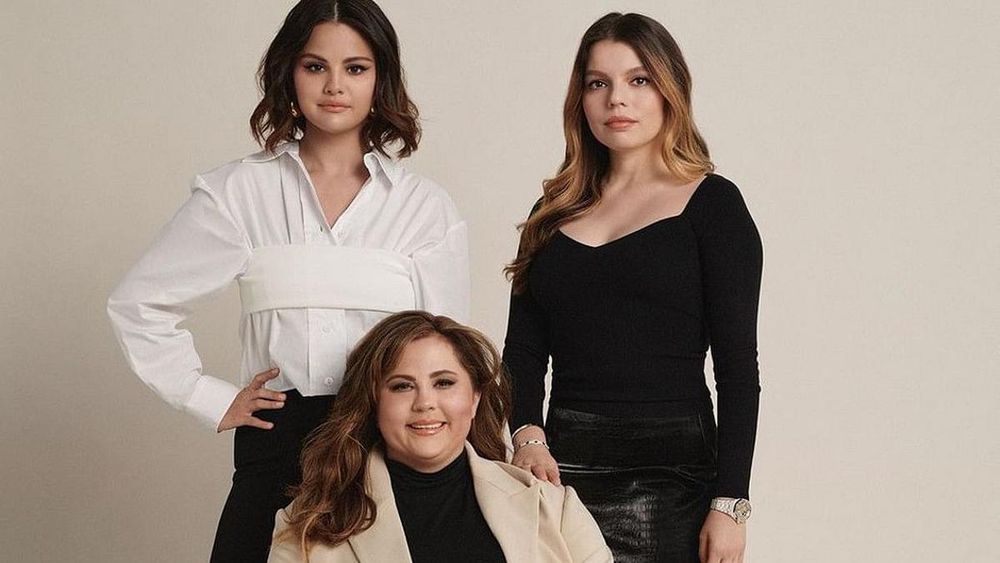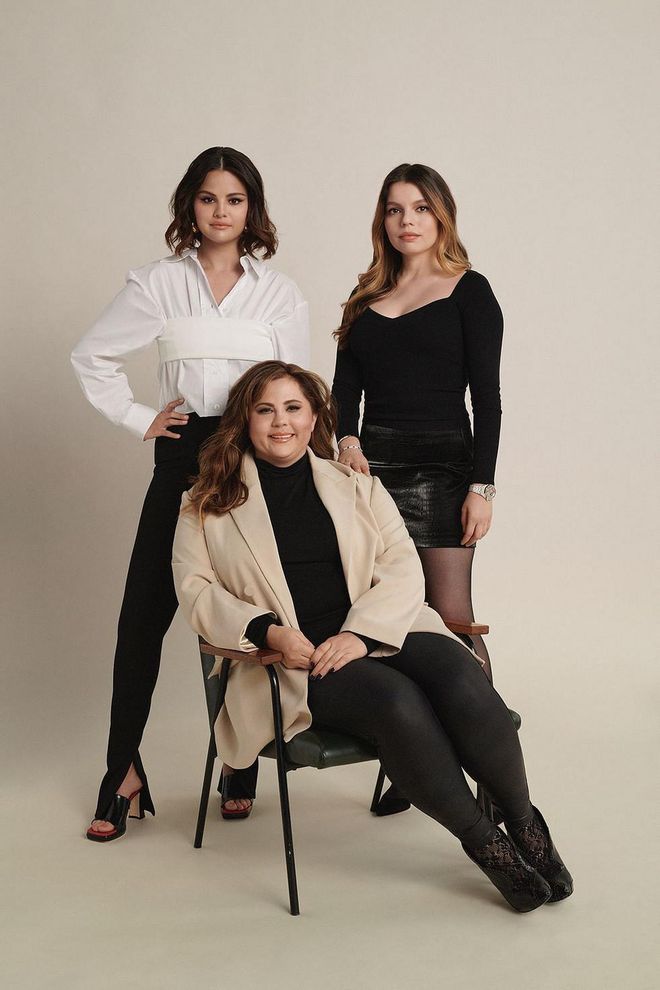Selena Gomez And Her Mom Launch Mental Fitness Ecosystem While "Living With Mental Illness"
"It's so important for us to remember that we're not alone," says Gomez, who debuted Wondermind with mom Mandy Teefey and The Newsette founder Daniella Pierson.


Photo: Wondermind
Selena Gomez Wondermind
Everywhere we go, we are reminded of our health: on the organic shelves at Trader Joe's, on the sustainable clothing racks at Nordstrom, in the workout Mirror ads on the New York City subway, on the windows of every Lululemon in town, and especially on social media, where it seems every TikTok influencer is also now a gluten-free chef and a fitness guru. It's hard to ignore the wellness trend that has overcome our society—though we are, ironically, still in the middle of a pandemic—which is why it's so concerning that while we give our physical health such attention, we continue to fail to address the importance of our mental health.
According to Mental Health America, this year 19.86 percent of U.S. adults (nearly 50 million Americans) are living with a mental illness, and 4.91 percent of those are experiencing a severe mental illness. At the same time, 18.1 percent of the population (40 million adults) suffer from anxiety, one of the most treatable conditions, and yet only 36.9 percent of those people receive treatment, per the Anxiety & Depression Association of America. The metrics are alarming, especially given the rise in mental health conversations being had online and on public stages, where many political, sports, and entertainment figures have opened up about their mental health journeys.
Selena Gomez, one of the many celebrities who has recently admitted to struggling with mental health issues, is now looking to take the conversation much, much further. Along with her mother, Mandy Teefey, and The Newsette founder Daniella Pierson, Gomez has debuted Wondermind, a media ecosystem where mental fitness is openly discussed, and where users can go to hear people's stories, learn more about different conditions from medical professionals, and actually get help.
"We want to keep the conversation just like real talk and relatable to everyone," Teefey tells me via Zoom. "We are three founders living with mental illness, we don't have the answers. So I feel like we're going to be together in the process, not talking down, we will be talking together."
Related article: Selena Gomez On What Inspired Her To Launch Rare Beauty
Phase one of the launch is the Wondermind newsletter, which users can sign up for without any cost and via which they will regularly receive personal stories, medical articles (in accessible, nonthreatening language), and answers to mental wellness questions. Wondermind will then debut various podcasts and sell physical products—cognitive behavioral therapy (CBT) tools and dialectical behavior therapy (DBT) tools—to help people struggling with various conditions.
"Our goal is to create an honest, safe, comfortable place that everyone can turn to," Gomez says. "In our first drop of Wondermind, we're offering everything from interviews with noteworthy personalities and experts to tips and exercises for practicing your own mental fitness, resources, and more."
But Gomez insists Wondermind isn't just a platform for people with diagnosed mental illness. "We designed it to be a space for anyone and everyone to be able to turn to—whether you're actively struggling, have a friend who is struggling, or just want to educate yourself on the various aspects of mental health," she says.
In the past several years, Gomez—who has lived nearly her whole life in the spotlight—has spoken publicly of her bipolar diagnosis and the anxiety and depression she has suffered as a cause of her physical ailments, such as lupus. Her openness about her mental health struggles has inspired many, including Pierson, who tells me Gomez's bravery pushed her to address her own insecurities regarding her ongoing OCD issues.
Teefey, too, has had a long journey with mental health. "I've been dealing with my mental health since I was about 16, and I was misdiagnosed as bipolar. And right before we started shooting Season 2 of 13 Reasons Why, my medication, my hormones, and everything just started changing," she tells me. Because she was put on the wrong medication due to her misdiagnosis, all while she was going through menopause, Teefey says she started having seizures and severe insomnia. So she checked herself into a facility, which she says, "is the best thing I've ever done—but not everybody has that kind of money or the insurance that covers it to take that personal time and do it."
Now living with attention deficit hyperactivity disorder (ADHD) with trauma, Teefey says one of the many things that convinced her to start Wondermind with her daughter and Pierson is remembering how difficult it was for her to get help in her 20s. "I was, like, going around to interview doctors, not understanding what's going on, and going through all these different medications. It would've been great to have a resource to see how to meet with a therapist, how to explain yourself to the therapist," she says, adding that a doctor once gave her medicine for hallucinations because she said she saw a black butterfly—"but it could've just been a black butterfly."
Pierson agrees, saying that the stigma and the misinformation surrounding mental health when we were younger is the reason she didn't get help for her OCD and depression much sooner—that, and the fact that she grew up with very traditional half-Colombian family, in which mental illness was simply not in the conversation.
Related article: Selena Gomez’s Rare Beauty To Raise $100 Million For Mental Health Initiatives
During our talk, I tell the founders how true it is that in Hispanic cultures like ours, the stigma around mental health can often be much stronger, and it's common to grow up with parents who don't believe in therapy, or think it's weak to seek help for anything that isn't a physical injury.
Teefey tells me it's because of that they plan to conduct research studies in various countries and cities around the world, to see how different cultures think about mental health and mental illness, and how best to help people from different communities get educated on the topic and receive therapy, or treatment, if that is what they need. "We're gonna have regular conversations about them and it's not going to be intimidating; we have two Latina cofounders and a diverse advisory board," she says.
Pierson insists they are not trying to be a replacement for therapy, and in fact, they encourage all people (diagnosed with mental illness or not) to work on their mental fitness the way they work on their bodies.
"We started this company because we wanted to really tackle the stigma, and because we want to democratize mental health and make it something cool and attainable to all," Pierson says.
"It's so important for us to remember that we're not alone, and we wanted to create a community to encourage users to go to know that they're seen and heard, and that their feelings are valid," Gomez adds.
This article originally appeared on Harper's BAZAAR US.
Related article: Selena Gomez Blacked Out Her Site And Urged People To ‘Come Together’ For Black Lives Matter